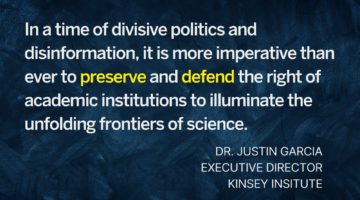Sex Question Friday: Are My Stereotypes About Polyamory True?
June 28, 2013 by Justin Lehmiller
Every Friday on the blog, I answer people’s questions about sex, love, and relationships. This week’s question comes from a reader who wanted to know more about the topic of polyamory. In case you aren’t familiar with this term, polyamory refers to a non-monogamous approach to relationships in which someone may have intimate involvement with several persons simultaneously. The question at hand in this post is whether the practice of polyamory is linked to sexual abuse and low self-esteem.
I have quite a few friends who identify as polyamorous. In my personal experience with a small biased sample of people, it has been revealed to me during the course of these friendships that nearly all of these poly people have experienced sexual trauma or abuse in their past before seeking out polyamory. This has definitely created a stereotype in my mind: That polyamorous individuals seek out multiple relationships to cope with poor self-esteem and to avoid concentrated intimacy with one person. I don’t really like that I have this stereotype in mind. As a pansexual person, I’ve had to deal with a lot of sexual stereotypes myself. But it does truly feel like every time I befriend someone polyamorous that they are psychologically unstable in some way. Is there any research out there on polyamory that can either dispel or confirm this stereotype?
Unfortunately, there isn’t much research I can point to that directly addresses your question because very few scientists have attempted to study polyamorous individuals and relationships. I am conducting a large-scale study of polyamory with a few of my colleagues right now and we are in the process of writing up several journal articles on this topic that will help to fill in some of the gaps in our knowledge. Our findings will not be released for a little while; however, we hope that our efforts will eventually inspire other scientists to start working in this area.
With regard to the specific stereotypes you mentioned, I would caution you against making too many generalizations based upon your own personal experiences with polyamorous individuals. It’s unlikely that you have met and interacted with a representative enough sample of the community to draw such conclusions about all polyamorous persons’ past experiences, motivations, and psychological health.
That said, it is interesting that you have observed a link between sexual abuse and polyamory. Other people have casually mentioned the same thing to me before. Although I am not aware of any research looking specifically at the link between polyamory and sexual abuse, it is worth pointing out that there are several studies showing an association between childhood sexual victimization and adult sexual orientation (I know polyamory isn’t a sexual orientation, but bear with me for a moment). Specifically, gay, lesbian, and bisexual persons report higher rates of childhood sexual abuse than their heterosexual counterparts [1]. On the basis of these results, some have argued that having a history of abuse may contribute to the development of alternative sexual identities (e.g., to the extent that being victimized causes one to have a stigmatized identity, it may make it more likely that such individuals adopt other stigmatized identities later in life). Such theories are incredibly controversial and are by no means definitive. Also, I don’t personally buy into these theories because not all sexual minorities were sexually abused, and not everyone who was sexually abused ends up adopting a minority sexual identity.
An alternative explanation for the link between higher rates of sexual abuse and alternative sexualities is that perhaps people with alternative sexualities are just more comfortable talking about sex and sharing their sexual histories. As a result, it may not be that these individuals were more likely to be victimized; rather, it may just be that they are more willing to admit to themselves and to others that it happened. I mention this because it’s quite possible that a similar phenomenon may be occurring with the polyamorous persons you have met (i.e., perhaps poly people are just more likely to share their sexual histories than the average person, which is why sexual victimization is more likely to come up in their discussions). Also, it is worth noting that sexual victimization is not a rare thing to start with. For instance, if you look only at childhood sexual abuse, meta-analyses put the rate at about 8% among men and 20% among women [2]. Thus, it is highly unlikely that your polyamorous friends are the only ones in your life who have had previous experiences with sexual victimization—in actuality, you probably know far more non-polyamorous survivors who just have not said anything.
Regarding the question of poor self-esteem, again, I don’t know of any research that directly addresses this question; however, in a recent survey I saw comparing a sample of 4,000 self-identified polyamorous participants to a national U.S. adult sample, polyamorous individuals reported levels of personal health and happiness that were about equally high relative to the national sample. Thus, it does not seem to be the case that being polyamorous is linked to worse physical or psychological health.
Obviously, much more research on this topic is needed before we can draw definitive conclusions; however, I hope I have made the case for you that it would be wise not to put too much stock into your stereotypes about polyamory because there’s not a lot of empirical evidence to back them up.
For past Sex Question Friday posts, see here.Want to learn more about The Psychology of Human Sexuality? Click here for a complete list of articles or like the Facebook page to get articles delivered to your newsfeed.
[1] Roberts, A.L., Glymour, M.M., & Koenen, K.C. (2013). Does maltreatment in childhood affect sexual orientation in adulthood? Archives of Sexual Behavior, 42, 161-171.
[2] Pereda, N., Guilera, G., Forns, M., & Gómez-Benito, J. (2009). The prevalence of child sexual abuse in community and student samples: A meta-analysis. Clinical Psychology Review, 29, 328-338.
Image Source: 123rf.com
You Might Also Like:

Dr. Justin Lehmiller
Founder & Owner of Sex and PsychologyDr. Justin Lehmiller is a social psychologist and Research Fellow at The Kinsey Institute. He runs the Sex and Psychology blog and podcast and is author of the popular book Tell Me What You Want. Dr. Lehmiller is an award-winning educator, and a prolific researcher who has published more than 50 academic works.
Read full bio >


